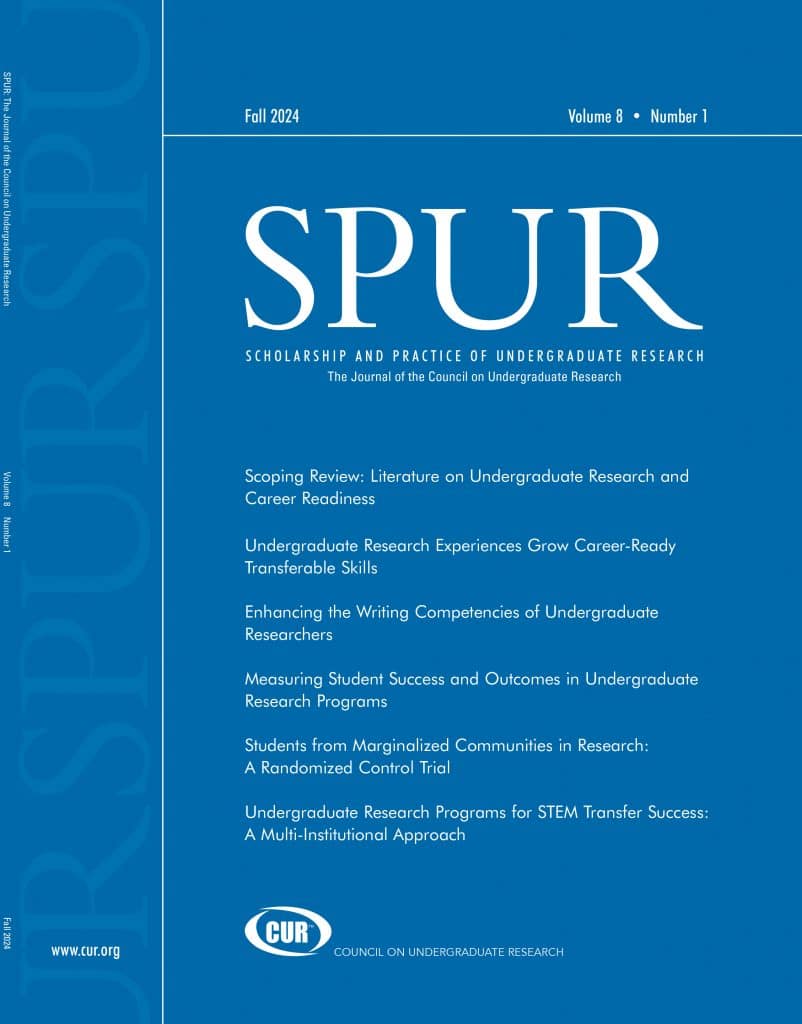SPUR (2024) 8 (1): https://doi.org/10.18833/spur/8/1/2 Abstract:
Undergraduate research, scholarship, and creative inquiry (URSCI) experiences are found to enhance student growth in skill development. Previous research has not established what literature exists on intentionally preparing students for work through URSCI experiences in the United States. A scoping review was conducted to systematically map what the literature reveals that faculty, programs, and institutions are intentionally providing with URSCI experiences. Five databases and Google Scholar were searched. Data were charted by characteristics tied to the research question. The results demonstrated a need for research on URSCI to intentionally and directly assess how undergraduate research can be used as a tool for career readiness. The current reliance on the implicit aspects of the URSCI experience to develop career readiness competencies is not a sufficient approach.
SPUR (2024) 8 (1): https://doi.org/10.18833/spur/8/1/1 Abstract:
Although higher education aims to provide holistic learning and career preparation, there is growing skepticism about its value, with segments of the public scrutinizing concerns about tuition, student loan debt, and job prospects. Between 2015 and 2020, Florida Gulf Coast University implemented a quality enhancement plan (FGCUScholars) that worked to integrate undergraduate research throughout the curriculum to enhance career-ready transferable skills in response to institutional assessments and employer feedback. Results from annual assessments indicated that research participants demonstrated higher skill levels relative to students who completed alternative capstones. Furthermore, continual exposure to research skills throughout the four-year curriculum and emphasis on information literacy led to higher skill levels. This study highlights some positive impacts of undergraduate research on transferable skills, emphasizing their relevance across disciplines.
More Articles in this Issue
- Introduction‐ Shauna Reilly
SPUR (2024) 8 (1): https://doi.org/10.18833/spur/8/1/7 Abstract:The themed Fall 2024 issue of Scholarship & Practice of Undergraduate Research (SPUR): Career Readiness features content addressing career skills obtained through undergraduate research. The collection offers two open-to-read articles that contribute to our understanding of the current state of career readiness as achieved through undergraduate research and transferable skills. It also includes four additional articles, including writing skills, career readiness from the National Science Foundation’s (NSF) Research Experiences for Undergraduates (REU) programs, mentoring; and transfer students in science, technology, engineering, and mathematics (STEM).
- Article‐ Thomas Polk
SPUR (2024) 8 (1): https://doi.org/10.18833/spur/8/1/3 Abstract:The ability to effectively communicate, particularly in writing, ranks among the most highly valued competencies employers seek in new hires. Despite this, recent graduates commonly experience challenges when adapting to workplace writing practices. This article explores how undergraduate research experiences prepare students to write beyond the university. The author argues that undergraduate research experiences provide a significant opportunity to enable career-ready writing, but that this opportunity could be enhanced by preparing mentors to more intentionally guide writing development. A qualitative study of 11 undergraduate researchers suggests that students develop a number of genre-specific writing competencies and the genre awareness that is important to preparation for career-ready writing. Based on this analysis, the author offers recommendations for enhancing undergraduate research students’ preparation for career-ready writing.
- Article‐ Andrea Weidman, Abigayle Parham, Molly H. Fisher, Jennifer Wilhelm
SPUR (2024) 8 (1): https://doi.org/10.18833/spur/8/1/6 Abstract:This study explores the effect the U.S. National Science Foundation Research Experiences for Undergraduates (NSF REU) programs have on REU participants and other undergraduate student researchers and how their success was measured. The authors conducted interviews with 10 principal investigators (PIs) of REU programs and surveyed undergraduate researchers from NSF REU programs as well as non-NSF programs. Overall, the undergraduate researchers studied indicated that the skills with the greatest gain as a result of their program were their research skills, knowledge of graduate school, and presentation skills. PIs and undergraduate researchers agreed that presentations and posters are the most notable metrics of success in their programs. As a result of the findings, the authors present a definition of a successful undergraduate research program in the discussion.
- Article‐ Beverly L. Kahn
SPUR (2024) 8 (1): https://doi.org/10.18833/spur/8/1/4 Abstract:The Research-Aligned Mentorship (RAM) program at Farmingdale State College is changing the trajectories of racial minority students, students of low socioeconomic status, and first-generation undergraduate students. This article reviews the RAM program from 2016 through 2022. During that period, Farmingdale welcomed seven cohorts of RAM Scholars, totaling 1530 students from historically marginalized groups (or 28 percent of each entering class of first-time, full-time students). This randomized control trial demonstrates that students from marginalized communities who enter college with varying records of prior academic achievement can succeed in undertaking rigorous mentored research. Furthermore, students in the RAM program have achieved superior outcomes in four year graduation, retention, credits earned, and grade point average when compared to the control group of students from the same historically marginalized groups.
- Article‐ Kimberly R. Schneider, Michael Aldarondo Jeffries, Colleen M. Smith, Donna Chamely-Wiik, William R. Kwochka, Daniel Meeroff
SPUR (2024) 8 (1): https://doi.org/10.18833/spur/8/1/5 Abstract:Transfer students face many challenges transitioning to a four-year institution, yet support for transfer students can be less comprehensive than for their first time-in-college (FTIC) counterparts. Three four-year universities established the Learning Environment and Academic Research Network Consortium to address this need. They developed and tested a research program for transfer students, Transfer Learning Environment and Academic Research Network (T-LEARN), adapted from a successful STEM FTIC research program. In this adapted model, incoming transfer students engage in a year-long undergraduate research learning community. When compared to the matched comparison group of students, the T-LEARN students showed significant persistence and graduation rate gains at all three institutions. These gains positively impacted student achievement and persistence in STEM. This model provides a foundation for other institutions seeking to support transfer student success.


